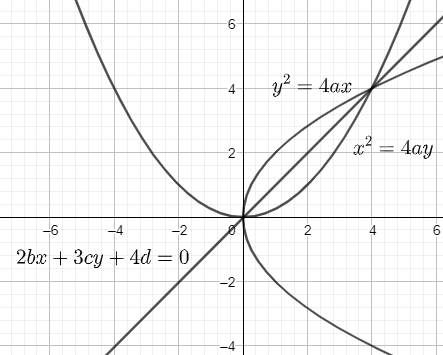Question
Question: If \(a\ne 0\) and the line \[2bx+3cy+4d=0\] passes through the points of intersection of the parabol...
If a=0 and the line 2bx+3cy+4d=0 passes through the points of intersection of the parabola y2=4ax and x2=4ay, prove that d2+(2b+3c)2=0.
Solution
Hint: We have to find the values of x and y to get the points of intersection of the two parabolas by rearranging the two equations y2=4ax and x2=4ay. Then, it can be substituted in the equation of the line.
Complete step-by-step answer:
Two parabolas y2=4ax and x2=4ay are given in the question. A line that passes through the points of their intersection is given as 2bx+3cy+4d=0. Let us consider the plot as below,

The first step is to find the points of intersection of the parabolas. Let us consider the two equations as below,
y2=4ax………(i)
x2=4ay………(ii)
From equation (ii), we can substitute y=4ax2 in equation (i). Therefore, we get
[4ax2]2=4ax16a2x4=4ax16a2x4−4ax=0
Taking LCM, we get,
